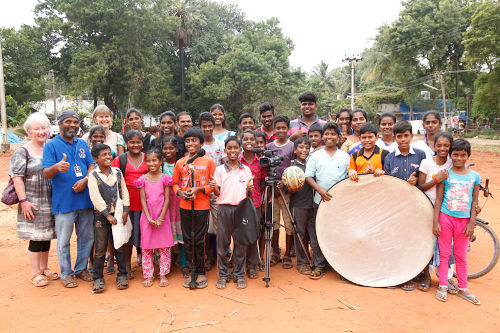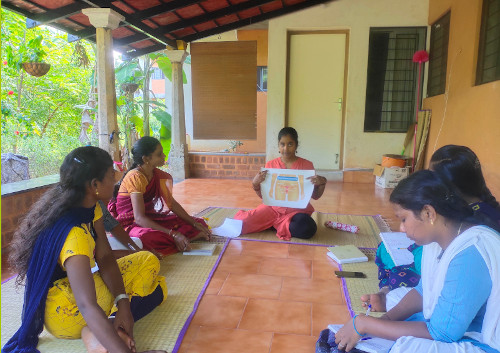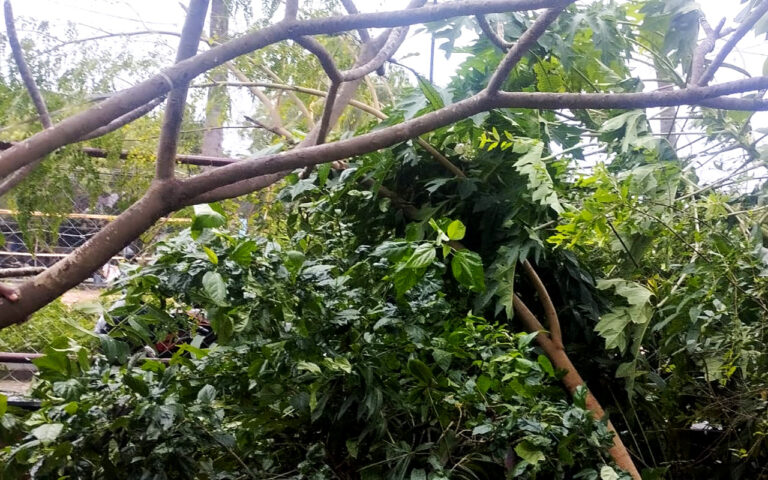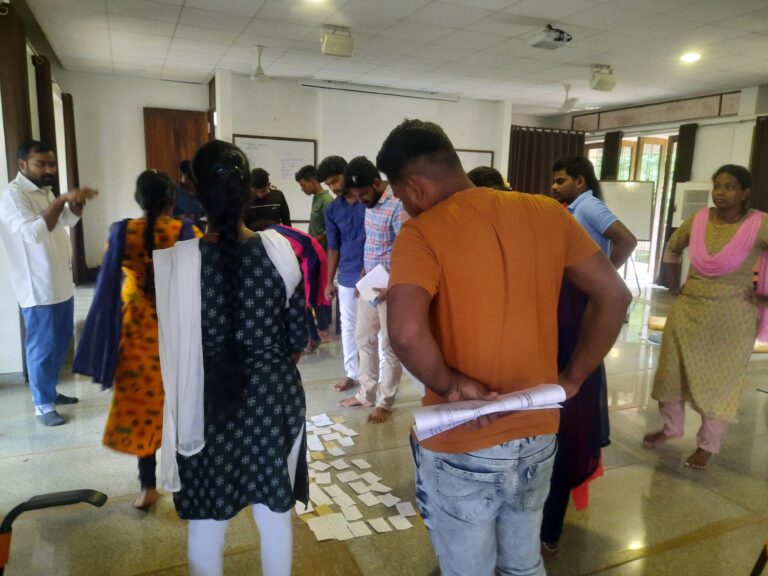My interview with Ciarán, a dedicated volunteer at Thamarai, was nothing short of inspiring and introspective. As I sat down to chat with him, I was immediately struck by his genuine passion and deep connection to the work he was doing in the community. Here’s what Ciaran’s year-long experience with Thamarai taught him while he shared his learning through teaching.
Tom: What did you know about Thamarai before you came?
Ciarān: Very little. I knew that Bridget did tremendous work teaching children, helping them have experiences that were beneficial to them. While in Ireland, I had been introduced to some of the children and facilitators of Thamarai during the Covid lockdown when I facilitated chess classes and tournaments through Google Meet video calls.
However, thanks to Bridget visiting Ireland once every few years, I did know her pretty well. She’s a powerful force of nature, to say the least, and if she dedicated so much of herself to Thamarai, I knew I could trust that. We actually climbed Croagh Patrick, a very special Irish mountain, together in 2020 and talked about Thamarai and how I could contribute. By the end of the climb, I had decided to step away from my career and volunteer in Thamarai for a year. A decision and climb I am very thankful for!
Tom: What were your expectations – personal and other?
Ciarān: My expectations were subtle. I didn’t really think about Thamarai or India so much after I made my decision to come, and the coming was 9 months long, due to visa delays. But my experiences in life had me expecting a different reality to the one I arrived at.
After arriving, I expected to be teaching in the traditional way, imparting knowledge and information. But it didn’t work like that. It quickly became clear that after-school was about facilitation rather than teaching. When I tried to teach at the beginning, the children didn’t engage and they got bored. But when I am facilitating, the children and I are participating together in learning. They play chess, type, build designs in Virtual Reality art studios, and tell stories to each other in English. My role is merely to design activities that will allow them to engage themselves, not at all in telling them answers, facts, or “the right ways” to do things.
When they need something, they ask me or their peers.
For example, when I started the typing classes, my approach was to tell the children what to do, to follow instructions and learn skills. This did not work well. So I changed the method to introducing an activity that the children could follow, e.g., www.typing.com. The children self-learn and are self-motivated. They remain actively engaged as long as they are interested. They ask me whenever they need some help for things they don’t yet understand. Once I show them, they learn and are then proud to assist their classmates the next time that problem raises its head.
Top-of-the-classroom teaching was what I experienced in school in Ireland, and to be honest, I found classes boring and disengaging.
Here in Thamarai, I am a part of the class. It feels like I’m a big brother showing my younger siblings things I’m passionate about and then sharing the experience with them.
Tom: What was your first impression upon arriving?
Ciarān: Mind-expanding. I walked and ran every morning once I arrived here, constantly getting lost and through this learning about my new home and its paths. I met: snakes, lizards, boar, mongoose, singing birds, chirping crickets, and people. All of who would not be on my morning runs in Ireland!
As well as the new environment, the collective mindset was completely new to me here. Before coming, I had the expectation that things would go according to how I planned or expected, probably due to the more stable weather conditions back in Ireland. I understood that plans would be successful so long as I completed my tasks in them. Plans were very physical and real to me.
It was jarring in the best way, to discover how fluid things moved here. I learned that a plan is merely an approach to a situation. Here in Tamil Nadu, the environment/weather/life causes so many things to change that often the situation has changed so much from when the initial plan was made that holding onto it isn’t only useless but actually harmful.
Holding onto my ideas of how things “should go” was causing stress to build in myself and had me really struggling in the early months being here. But once my mindset shifted to this new way of thinking about plans as fluid things that should change as the situations they aim to impact also change.
Tom: What was your initial impression of the team?
Ciarān: Electric. Facilitators had lots of energy and were focused on what they were doing. They were so friendly and welcoming. Soon after I joined, Abishek and Swathi (two facilitators from Annai Nagar village) were leaving for a year to Germany. I had great conversations with them and was inspired by their courage to leave the only homes they’d known for a chance of new experiences and also in the way of building their community by nurturing the education of their village’s children.
Tom: What was your initial impression of the children?
Ciarān: Hilarious. They all wanted to touch my hair (I have a massive ginger afro, strange for Irish kids to see, nevermind Indian children!). I made a rule that they should first ask me before touching my hair; they learned a new English phrase that I still hear at the centre to this day.
“Ciarān, can I touch your hair please?”
They all respected this rule and showed me that they respected me also. They are like little brothers and sisters to me.
I’ve been coming to Annai Nagar village every morning, 7 days a week for the last 9 months. And every morning without fail, there’s some of the Thamarai kids shouting to me from their house or waving to me, welcoming me to their village and wishing me a good morning. Everyone looks out for each other – and for me too. A big, chaotic, loving family (very similar to my own in Ireland actually, just with a lot more energy).
Tom: What was your initial impression of the program?
Ciarān: Startling. In good and bad ways.
In homework support sessions, it was painful to see that the official school curriculum has a system where these children, who speak fluent Tamil, are learning about their own history and subjects through books written in English, which most can read but not understand.
In Thamarai afterschool, I was blown away by the effectiveness of the Thamarai program and format. Here in Thamarai, the tools and rituals are so much more advanced than anything I experienced in Ireland.
The opening and closing circles in the centre are used to bring all the children and facilitators into a similar state of mind, focus, and calm. Here we use rhythms and breathing practices in these sessions which are led by the kids themselves!
“Slowly breathe in, slowly breathe out….”
In these large circles, the children have space to acknowledge whoever they want to thank, be it facilitators or their friends. The children also have space to share something they are proud or passionate of. Like jokes, paintings, facts they’ve learned, or things they have made.
In our facilitator check-ins when we plan the day’s session, we always start with a self-check-in to see how we are feeling at that moment, and take time to settle and center ourselves.
The meditation, where children are asked to close their eyes, be silent, breathe slowly. To send thoughts of love and kindness. I feel this is all light years ahead of my experiences in Irish schools.
There is a very conscious energy in Thamarai. This is a place where facilitator staff have agency to change the systems, adapting and championing Thamarai to be a tool that works for their, and their children’s needs.
Not solely focused on grades. It is radical compared to traditional school methods. There is a life focus accompanying a skills focus in Thamarai. This is one of the most important aspects of Thamarai, second only to community. Where village children can use Thamarai as a support to develop their own selves, their village, and environment.
Tom: In what educational areas did you contribute?
Ciarān: My activities have been focused on: Spoken English, Chess, Computer/IT Literacy, and Virtual Reality tools.
I provide a time and space for the children to develop and practice in my activities. I’m passionate about chess, love literature, have a gift for technology and troubleshooting. These qualities have allowed me to share these passions with the Thamarai kids.
In my chess sessions, we mostly play games together. I’ll often show the kids an opening that can be powerful or a checkmate to win a game. Then we play, and I’ll use that same example on them, showing them that it does indeed work. The children then either are interested in this and will learn by practicing, or they won’t be and simply play with their friends. There is a wide spectrum of interest in these children. We stress respect by wishing each other good luck. We constantly remind them that losing matches is where the learning occurs, and winning simply shows you this growth rather than giving more of it.
In my typing sessions, I do very little, to be honest. Initially, it was designing the class. But since it’s self-directed, my hands-on work is rather small. It’s mostly praising and encouraging the children when they apply themselves to type without looking, and sometimes fixing laptops and computers that run into difficulty for one reason or another.
The kids now have a system that is completely self-directed, and they have built support groups to help each other with answering recurring questions (how to connect to wifi / how to log into the laptop / ……) I developed this system, and now that it’s in place, any of the Thamarai facilitators can facilitate the typing classes as long as it’s beneficial.
In my English classes, we focus on improving three things: Speaking, Reading, and Writing skills. The children each express which they have a stronger motivation to improve, and then that aspect gets focus, but all are still developed. I structured my classes to ensure the children are engaged throughout.
We do many different activities: play games like ’20 questions’ (which practices correct ways to ask and answer in conversation). We read story picture books chosen by the children, and constantly stop the reading to ask them what do they understand from the pictures attached to the books, (this practices their ability to express themselves and what they understand). We also do story writing sessions, where together we create a verbal story with a beginner and middle. The children then write their individual endings and read them at the end of the class.
VR (please say more)
I have been blessed to be able to facilitate VR sessions with alumni (13+). This has exposed them to countries, animals, mountains, and real Irish young people of their own age. To use creative tools that would otherwise be completely out of their reach.
Tom: How did you contribute to Thamarai’s operations?
Ciarān: I have previous Project Management qualifications and global event management experience. These skills were extremely useful for the Thamarai team to establish best practices and build systems to tackle administrative and operational problems. I could troubleshoot and offer suggestions, introduce tools that would help us to address recurring issues, and do our work more easily and efficiently. It was great to see people using new tools that helped them with their work.
Tom: Can you tell me some highlights and high memories from your time with Thamarai?
Ciarān:
Thamarai Camps: Powerful for breaking the idea that things need to go according to plan to be good. Just because things don’t go according to plan doesn’t mean it’s bad. The importance of keeping moving with good intentions. Judge results through the experience rather than whether it went according to plan. This liberated me from being attached to plans.
Jumping high to pick mangoes from trees after a rock climbing session with the children. They cheered me on and pointed out mangos they wanted me to grab. The children then showed me how to eat raw green mangoes, which was a great experience.
In my second week here I dug a hole for a tree in Thamarai gardens. I was working hard, digging into rock-hard soil with an Indian shovel called a mumty, sweating and making very little progress, to be honest. The young Thamarai children, Pushparaj, Haripa, and Harsini, threw water on the soil and showed me how to dig in this new red soil. They helped me to shift mud and lift stones. It was a tremendous bonding experience with Thamarai and the community in Annai Nagar.
Cooking with Ananthi and Aswini for the potluck. I burned my finger in hot oil – Aswini stuck my hand into the grated potato, cooled it, and avoided damage.
Being in people’s lives, subtly nurturing and guiding children. Being respectful to the children. Treating them as peers. Being honest with them.
Tom: How do you feel Thamarai connects with and integrates into the village?
Ciarān: Thamarai creates the space that allows young people & children to come together, to help each other out, to address a need (homework, life skills), in a safe environment where you can get respected and your needs addressed. Young people have a place where they can contribute. They can give opportunities that they didn’t have themselves. The people in the village can make things happen. Locals lead locals – Thamarai provides the space to facilitate that.
Tom: What did you learn from your experiences in Thamarai?
Ciarán: A lot about different concepts. Looking at time differently. Being consistent is more important than being perfect. The approach is more important than the highlights and lowlights.
Tom: How do you see Thamarai progressing?
Ciarán: To a place less dependent on external support. A Tamil-led learning center run and managed locally. Supported by external friends and supporters but not dependent on them.
Tom: Where could Thamarai improve/add services?
Ciarán: Connect into the valuable life skills and experiences that can be found within Auroville-connected units and people. e.g. Forest walks, Community building in Youth Center.
Also, I think Thamarai will improve itself by continuing to enable people in the village to take more responsibility and agency in the direction Thamarai will develop. I see this as a core way of part of sustaining the core benefits Thamarai provides to the children using the services.
Tom: Where do you see Thamarai in one year and five years?
Ciarán: My only wish is that it continues to unfold and give benefit. I think Thamarai is serving a very strong purpose, so long as people benefit from the service, I will be smiling.
Tom: What image comes to mind when thinking of Thamarai?
Ciarán: I see inside of a wild forest. There’s a big, huge flower with a strong green stem and pink flowers. Water drops coming off of the leaves, bees are buzzing around taking and bringing pollen. Very vibrant, life and living among the other flowers, an






